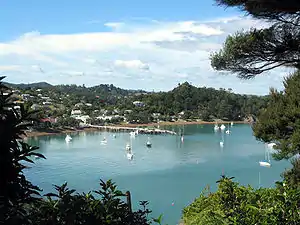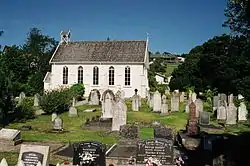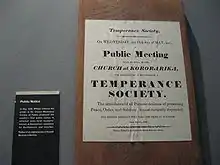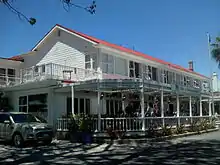Russell, New Zealand
Russell, sometimes referred to as Kororāreka, is a town in the Bay of Islands, in New Zealand's far north. It was the first permanent European settlement and seaport in New Zealand. In January 2023, the New Zealand Geographic Board Ngā Pau Taunaha o Aotearoa proposed that the town's name be officially changed back to Kororāreka, its original Māori name.[3]
Russell
Kororāreka | |
|---|---|
Town | |
 Russell | |
| Coordinates: 35°15′42″S 174°7′20″E | |
| Country | New Zealand |
| Region | Northland Region |
| District | Far North District |
| Ward | Bay of Islands/Whangaroa |
| Settled | Early 19th century |
| Named for | John Russell, Secretary of State for the Colonies |
| Electorates | |
| Government | |
| • Territorial Authority | Far North District Council |
| • Regional council | Northland Regional Council |
| Area | |
| • Total | 3.28 km2 (1.27 sq mi) |
| Population (June 2022)[2] | |
| • Total | 810 |
| • Density | 250/km2 (640/sq mi) |
| Postcode | 0202 |
History and culture



Māori settlement
Before the arrival of the Europeans, the area now known as Russell was inhabited by Māori because of its pleasant climate and the abundance of food, fish and fertile soil. The settlement was known as Kororāreka, and was located on the coast. The name translates to 'sweet kororā' (kororā meaning blue penguin and reka meaning sweet), after an ailing chief who had eaten a penguin broth remarked ka reka te kororā or 'the kororā is sweet'.[4][5][6] Early European explorers James Cook and Marc-Joseph Marion du Fresne remarked that the area was quite prosperous.[7]
European settlement
When European and American ships began visiting New Zealand in the early 1800s, the indigenous Māori quickly recognised there were great advantages in trading with these strangers, whom they called tauiwi.[8] The Bay of Islands offered a safe anchorage and had a large Māori population. To attract ships, Māori began to supply food, timber, and prostitution. What the Māori population wanted was respect, firearms, alcohol, and other goods of European manufacture.
Kororāreka developed as a result of this trade but soon earned a very bad reputation as a community without laws and full of prostitution. It became known as the "Hell Hole of the Pacific";[9] European law had no influence and Māori law was seldom enforced within the town's area. Fighting on the beach at Kororāreka in March 1830, between northern and southern hapū within the Ngāpuhi iwi, became known as the Girls' War.
On 30 January 1840 at Christ Church, Governor William Hobson read his proclamations (which were the beginnings of the Treaty of Waitangi) in the presence of a number of settlers and the Māori chief Moka Te Kainga-mataa. A document confirming what had happened was signed at this time by around forty witnesses, including Moka, the only Māori signatory. The following week, the treaty proceedings moved across to the western side of the bay to Waitangi.[10]
By this time, Kororāreka was an important mercantile centre and served as a vital resupply port for whaling and sealing operations. When the Colony of New Zealand was founded in that year, Hobson was reluctant to choose Kororāreka as his capital, due to its bad reputation. Instead he purchased land at Okiato, situated five kilometres to the south, and renamed it Russell in honour of the Secretary of State for the Colonies, Lord John Russell. Hobson soon decided that the move to the Okiato site was a mistake, and Auckland was selected as the new capital not long after.[11]
Kororāreka was part of the Port of Russell, and after Russell (Okiato) became virtually deserted, Kororāreka gradually came to be known as Russell as well. In January 1844, Governor Robert FitzRoy officially designated Kororāreka as part of the township of Russell. Today, the name Russell applies only to Kororāreka, while the former capital is known either by its original name of Okiato or as Old Russell.
Catholic mission
In 1841–42, Jean Baptiste Pompallier established a Roman Catholic mission in Russell, which contained a printing press for the production of Māori-language religious texts. His building, known as Pompallier Mission, remains in the care of Heritage New Zealand.
On 18 November 1844, while at anchor in the Bay of Islands, Mary Davis Wallis described Kororarika [sic] as a town "which appears small, consisting of a few houses along the shore, and cottages scattered here and there on the slope of the hills behind. Nothing is to be seen back of the town but lofty hills not particularly verdant."[12]
Flagstaff dispute
At the beginning of the Flagstaff War in 1845 (touched off by the repeated felling and re-erection of the symbol of British sovereignty on Flagstaff Hill above the town), the town was sacked by Hōne Heke, after diversionary raids drew away the British defenders. The flagstaff was felled for the fourth time at the commencement of the Battle of Kororāreka, and the inhabitants fled aboard British ships, which then shelled and destroyed most of the houses.[13]
Hōne Heke directed his warriors not to interfere with Christ Church and the Pompallier Mission.
Demographics
Russell covers 3.28 km2 (1.27 sq mi)[1] and had an estimated population of 810 as of June 2022,[2] with a population density of 247 people per km2.
| Year | Pop. | ±% p.a. |
|---|---|---|
| 2006 | 786 | — |
| 2013 | 702 | −1.60% |
| 2018 | 762 | +1.65% |
| Source: [16] | ||
Russell had a population of 762 at the 2018 New Zealand census, an increase of 60 people (8.5%) since the 2013 census, and a decrease of 24 people (−3.1%) since the 2006 census. There were 339 households, comprising 372 males and 390 females, giving a sex ratio of 0.95 males per female. The median age was 58.8 years (compared with 37.4 years nationally), with 69 people (9.1%) aged under 15 years, 66 (8.7%) aged 15 to 29, 351 (46.1%) aged 30 to 64, and 276 (36.2%) aged 65 or older.
Ethnicities were 86.6% European/Pākehā, 20.1% Māori, 1.2% Pacific peoples, 2.0% Asian, and 1.6% other ethnicities. People may identify with more than one ethnicity.
The percentage of people born overseas was 33.9, compared with 27.1% nationally.
Although some people chose not to answer the census's question about religious affiliation, 54.3% had no religion, 31.5% were Christian, 1.6% had Māori religious beliefs, 0.8% were Hindu, 0.4% were Buddhist and 0.8% had other religions.
Of those at least 15 years old, 153 (22.1%) people had a bachelor's or higher degree, and 102 (14.7%) people had no formal qualifications. The median income was $27,100, compared with $31,800 nationally. 87 people (12.6%) earned over $70,000 compared to 17.2% nationally. The employment status of those at least 15 was that 261 (37.7%) people were employed full-time, 114 (16.5%) were part-time, and 24 (3.5%) were unemployed.[16]
Much of the accommodation in the area consists of holiday homes or tourist accommodation.
Economy

Russell is now mostly a "bastion of cafés, gift shops and B&Bs".[13] Pompallier Mission, the historic printery/tannery/storehouse of the early Roman Catholic missionaries, Is the oldest surviving industrial building in New Zealand, while the town's Christ Church is the country's oldest surviving Anglican church.[17] The surrounding area also contains many expensive holiday homes, as well as New Zealand's most expensive rental accommodation, the Eagles Nest.[13] The photographer Laurence Aberhart lives here.
A car ferry across the Bay of Islands runs between Okiato and Opua, and is the main tourist access to Russell. There is a land connection, but this requires a substantial detour (the ferry route is only 2.3 kilometres, while the land route is 43.5 km[18]).
Education
Russell School is a coeducational full primary (years 1–8) school[19] with a roll of 70 as of April 2023.[20] The school opened in 1892.[21]
Notable people
- Lucy Takiora Lord (1842–1893), guide and interpreter
See also
References
- "ArcGIS Web Application". statsnz.maps.arcgis.com. Retrieved 12 April 2022.
- "Population estimate tables - NZ.Stat". Statistics New Zealand. Retrieved 25 October 2022.
- Tokalau, Torika (18 January 2023). "Proposal to change name of Russell township to original Māori name". Stuff. Retrieved 4 July 2023.
- "History of Russell". russellnz.co.nz. 9 February 2023. Retrieved 9 February 2023.
- McCloy, Nicola (2006). Whykickamoocow – curious New Zealand place names., Random House New Zealand.
- "Town of Russell could soon go back to its original Māori name". 1 News. 19 January 2023. Retrieved 27 January 2023.
- "PRE-CONTACT – TŌ MUA I A TAUIWI". Russell.
- Binney, Judith (2007). Te Kerikeri 1770–1850, The Meeting Pool, Bridget Williams Books (Wellington) in association with Craig Potton Publishing (Nelson). ISBN 1877242381.
- "Bay of Islands History". Jasons Travel Media.
- King, M. (1949). Port in the North: A Short History of Russell. p. 37
- NZETC. The Cyclopedia of New Zealand. The Seat Of Government, Page 8. Retrieved 7 November 2011.
- Wallis, Mary (a lady) (2002). Life in Feejee : five years among the cannibals, a woman's account of voyaging the Fiji Islands aboard the "Zotoff" (1844–49). Santa Barbara, Calif.: Narrative Press. p. 10. ISBN 1-58976-208-8.
- Russell (from the Lonely Planet New Zealand, 13th Edition, September 2006.
- "Te Kāhui Māngai directory". tkm.govt.nz. Te Puni Kōkiri.
- "Māori Maps". maorimaps.com. Te Potiki National Trust.
- "Statistical area 1 dataset for 2018 Census". Statistics New Zealand. March 2020. Russell (103800). 2018 Census place summary: Russell
- Petriello, Amy (28 August 2005). "Russell – the sleeping beauty". The New Zealand Herald. Retrieved 6 November 2011.
- Google Maps Directions
- Education Counts: Russell School
- "New Zealand Schools Directory". New Zealand Ministry of Education. Retrieved 12 December 2022.
- "Cosmopolitan Russell". Russell Lights. 9 (3). February 2006.
External links
- Russell (a local page about the town)
- Russell Info (tourism information from bayofislands.net)